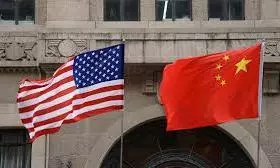
China blasts US over computer chip moves and student visa restrictions
text_fieldsTaipei: China blasted the US on Monday over moves it alleged harmed Chinese interests, including issuing AI chip export control guidelines, stopping the sale of chip design software to China, and planning to revoke Chinese student visas.
“These practices seriously violate the consensus” reached during trade discussions in Geneva last month, the Commerce Ministry said in a statement.
The United States and China have agreed to significantly reduce recent tariffs, aiming to revive stalled trade between the world's two largest economies, according to a joint statement.
However, last month's de-escalation of President Donald Trump's trade wars failed to resolve underlying tensions between Beijing and Washington. Monday’s statement underscored how such agreements can quickly lead to further uncertainty.
The deal, set to last 90 days, allows time for US and Chinese negotiators to work toward a more comprehensive agreement. Yet, tariffs remain higher than before Trump increased them last month, leaving businesses and investors grappling with doubts about the truce's longevity.
US Trade Representative Jamieson Greer stated that the US has lowered the tax Trump imposed last month from 145% to 30%. In response, China agreed to reduce its tariff rate on US goods from 125% to 10%.
China’s Commerce Ministry confirmed that it has upheld its commitments, cancelling or suspending tariffs and non-tariff measures imposed on the US as part of reciprocal actions outlined in the agreement.
"The United States has unilaterally provoked new economic and trade frictions, exacerbating the uncertainty and instability of bilateral economic and trade relations,” while China has stood by its commitments, the statement said.
It also threatened unspecified retaliation, saying China will “continue to take resolute and forceful measures to safeguard its legitimate rights and interests.” And in response to recent comments by Trump, it said of the US: “Instead of reflecting on itself, it has turned the tables and unreasonably accused China of violating the consensus, which is seriously contrary to the facts.” Trump stirred further controversy Friday, saying he will no longer be nice with China on trade, declaring in a social media post that the country had broken an agreement with the United States.
Hours later, Trump said in the Oval Office that he will speak with Chinese President Xi Jinping and “hopefully we'll work that out,” while still insisting China had violated the agreement.
“The bad news is that China, perhaps not surprisingly to some, HAS TOTALLY VIOLATED ITS AGREEMENT WITH US,” Trump posted. “So much for being Mr. NICE GUY!” The Trump administration also stepped up the clash with China in other ways last week, announcing that it would start revoking visas for Chinese students studying in the US.
US campuses host more than 275,000 students from China.
Both countries are in a race to develop advanced technologies such as artificial intelligence, with Washington seeking to curb China's access to the most advanced computer chips. China is also seeking to displace the US as the leading power in the Asia-Pacific, including through gaining control over close US partner and leading tech giant Taiwan.
(inputs from IANS)






